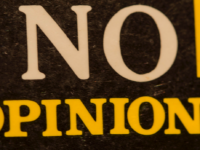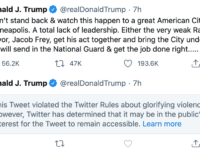The Canadian Broadcast Standards Council has ruled that a news broadcast that jokingly criticized Canadian content violates the Canadian Association of Broadcasters’ (CAB) Code of Ethics and the Radio Television Digital News Association of Canada’s (RTDNA) Code of Journalistic Ethics. The complaint arose from a December 2019 broadcast on Toronto radio station CFRB. David McKee used his lead-in to a report on a possible Netflix tax to state “the libraries of streaming services like Netflix, Disney+ could soon have more of a Canadian flavour that nobody watches or wants if the federal government gets its way.”
Latest Posts
The LawBytes Podcast, Episode 53: Welcome Development or Waste of Time? – A Conversation With Facebook Oversight Board Member Nicolas Suzor
Last month, Facebook revealed the names of the first 20 members of the Facebook Oversight Board, a body charged with conducting independent reviews of content removals. The group includes many well-known experts in the fields of human rights, journalism, law, and social media. The announcement received at best a mixed greeting – some welcomed the experiment in content moderation, while others argued that the board “will have no influence over anything that really matters in the world.”
Professor Nicolas Suzor of the Queensland University of Technology in Australia was named as one of the first 20 members. The author of Lawless: The Secret Rules that Govern our Digital Lives, Nicolas has been critical of Facebook and other Internet platforms and raised concerns about the oversight board when it was first announced. He joins me on the podcast to discuss the oversight board, the initial criticisms, and his views on how the board can have a positive impact in addressing complex issues that strive to balance freedom of expression with concerns about online harms. Note that our conversation was recorded before President Donald Trump issued an executive order targeting Internet platforms after Twitter fact-checked one of his tweets and issued a warning on another. The podcast will examine those latest developments in a future episode.
Why the USMCA Locks in the Internet Platform Liability System in the U.S., Canada and Mexico
U.S. President Donald Trump yesterday signed an executive order targeting Internet platforms after Twitter fact-checked one of his tweets on mail-in voting (the company followed up with a warning on another tweet earlier today involving glorifying violence). The order cannot simply reverse current U.S. law, but it encourages U.S. regulators to rethink how the Internet safe harbour provisions that limit liability for Internet platforms for third party content are implemented.
While the U.S. is obviously free to assess its statutory approach, one issue that received little attention is that the U.S. has effectively locked itself into the safe harbour system through its trade agreement with Canada and Mexico. The inclusion of safe harbour provisions in the agreement were viewed by some as an attempt to force Canada to adopt similar rules, yet the more likely reason for lobbying on the issue was to ensure that the U.S. itself was bound by the rules. Indeed, there were last minute efforts to remove the provision from the final deal, but those were ultimately rejected.
Privacy and Zambonis in the Age of COVID-19: My Ian Kerr Memorial Lecture
Last week, I had the enormous honour to deliver the first IAPP Ian Kerr Memorial Lecture. The IAPP and the broader privacy community has been incredibly supportive in the months since Ian’s passing, recognizing his exceptional contributions to the field and stepping up to help support the Ian R. Kerr Memorial Fund at the University of Ottawa. The Ian Kerr Memorial Lecture, which will be an annual lecture held by the IAPP, provided an opportunity to rediscover Ian’s scholarship and think about how he would been an essential voice during the current global pandemic. The lecture – along with introductions from IAPP President Trevor Hughes and UK Information Commissioner Elizabeth Denham – can be found here and is embedded below.
The LawBytes Podcast, Episode 52: Fair Dealing for Film Makers – Bob Tarantino on the Copyright Implications of the Room Full of Spoons Case
Dubbed by some as the worst film ever made, The Room has become a cult-like film classic. Written, directed, produced and starring Tommy Wiseau, the movie was the subject of the 2017 film The Disaster Artist and a documentary titled Room Full of Spoons by Canadian documentary filmmakers who wanted to tell the story of the film and its popularity. The documentary has been the subject of years of litigation with Wiseau at one point obtaining an injunction to stop its release.
The Ontario Superior Court of Justice recently released an important decision in the case with significant implications for creators involving copyright, fair dealing, moral rights, and a host of other legal issues. Bob Tarantino, Counsel at Dentons Canada LLP, joins me on the podcast this week to discuss why the decision will be welcome news for documentary filmmakers.











